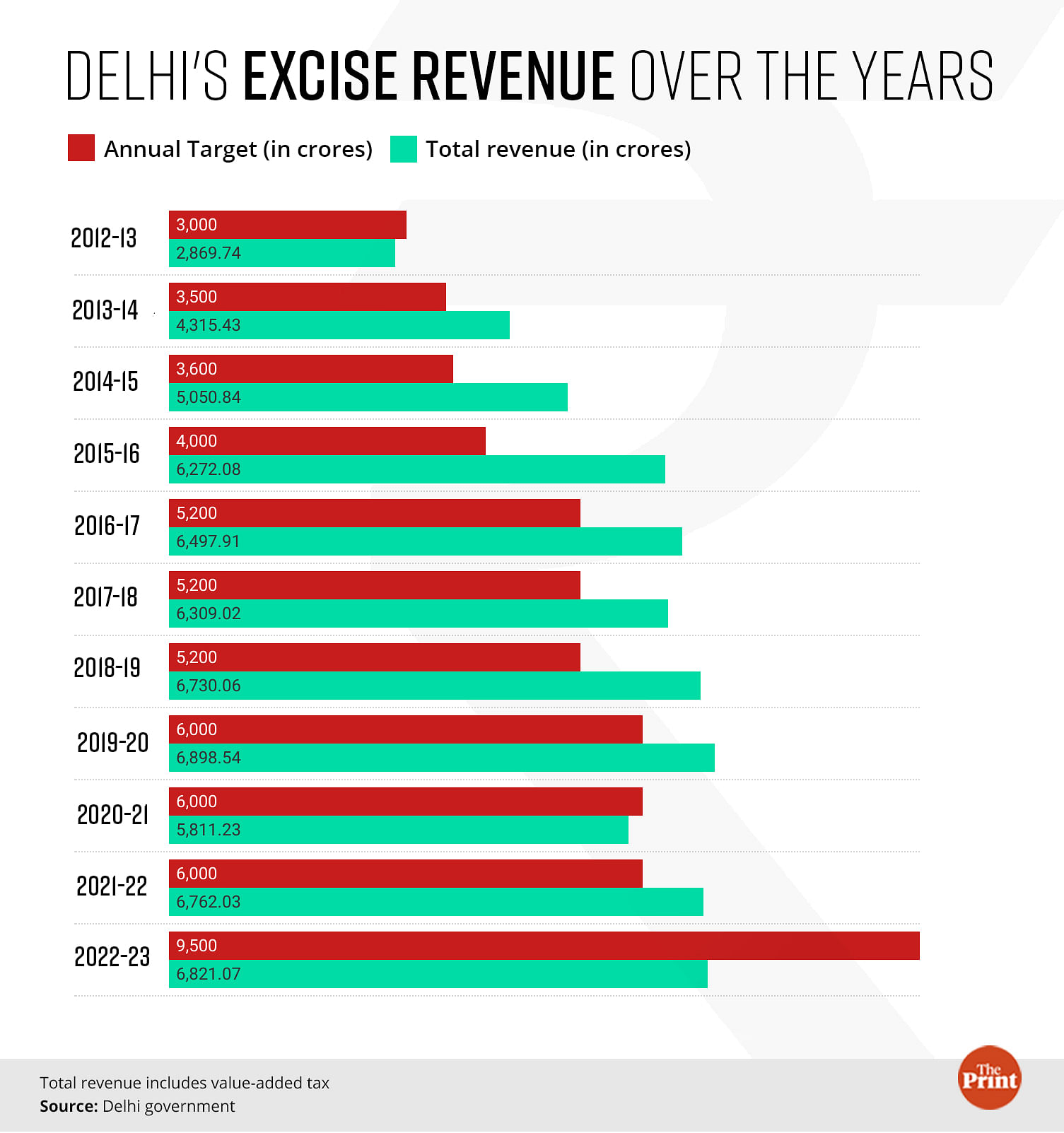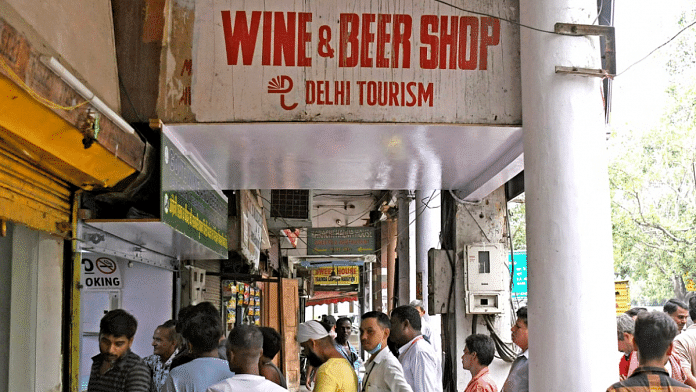New Delhi: The abrupt scrapping of Delhi’s controversial excise policy (2021-22) last year doesn’t appear to have made much of a dent in the Union territory’s revenues off liquor sales — and the government may have the non-brand-conscious drinker to thank for that.
In 2022-23, the excise department raked in Rs 6,281 crore in revenue (excise duty plus value-added tax).
While this is lower than the target set under the new policy — Rs 9,500 crore — it helped excise retain its position as the second largest revenue-contributor to the government.
Government officials told ThePrint that close to 80 percent of the total excise revenue comes from alcohol priced between Rs 300 and Rs 600 — a segment where consumers are OK switching between different brands, they said.
The officials, however, added that Delhi loses as much as 17 percent of its excise revenues to neighbouring regions like Gurugram, saying the satellite had stolen the march on higher-end liquor with attractive prices and a more bustling night-time economy, among other factors.
The Delhi excise policy launched in 2021 has emerged as one of the biggest controversies surrounding the Aam Aadmi Party (AAP) administration. It was implemented in November 2021, with an aim to reform liquor sales in the capital, and sought to leave the sale of liquor to private players.

However, it was scrapped in September 2022 amid allegations of undue favour to certain private players, and is currently being investigated.
Delhi then returned to its old policy (2020-21), where the sales are handled by government corporations, with over 500 vends catering to the city’s residents.
The old excise policy will remain in place till September, with a new policy under formulation.
The Gurugram challenge
According to the excise department, in 2022-23, the daily average sale stood at 17 lakh bottles, and the daily average revenue at Rs 19.71 crore.
Speaking to ThePrint about purchases in the Rs 300-Rs 600 segment, a senior Delhi government official said, “People who frequently buy from this category are not looking for a specific brand, they tend to choose from whatever alternatives are available within the same category.” The total revenue collection since 2012-13, he added, has shown an upward progression.
In 2021-22, a total of Rs 6,762 crore was collected as excise revenue, against a target of Rs 6,000 crore. The financial year 2020-21, when Covid first struck, saw the revenue fall marginally short of the same target, at Rs 5,811 crore.
A second senior Delhi government official said the Capital still loses some portion of its total excise revenue to neighbouring regions, such as Gurugram, where liquor is cheaper.
“And this is specific to the brands that are priced above Rs 800. Here the consumer is conscious of the brand. We are losing roughly 17 percent revenue to neighbouring regions, in the category priced at Rs 800 and above,” the official added.
There are multiple reasons for this, the official noted, adding that they range from the availability of fast-moving brands [which fall in the Rs 800-Rs 1,500 price category], attractive prices and discounts to longer operational hours of liquor vends and presence of a night-time economy, among others, which remain absent in Delhi’s case.
There is an absence of fast-moving brands under the above-mentioned category in Delhi, the official said, adding that their presence can take the total annual revenue beyond Rs 7,000 crore.
“Two companies [Pernod Ricard and IndoSpirits] that are widely popular brands are currently not registered in Delhi, their licences were not renewed because their names have been included in the FIR on the alleged excise scam,” the official said. “And this has affected the availability of popular brands, while they continue to remain available in Gurugram, for instance.”
‘Improvements being explored’
The scrapped Delhi excise policy envisaged a total of 849 vends — including five super premium vends.
However, the Opposition raised certain concerns over liquor shops being opened in residential and non-conforming areas [Former commissioner (planning), Delhi Development Authority, A.K. Jain explained non-conforming areas as “those that do not comply with the provisions listed in the Master Plan for Delhi — from having no defined land use to not complying with environmental parameters”].
The second senior Delhi government official quoted above noted that a peculiar issue currently exists in the non-conforming areas, where the government’s liquor vends have no presence.
The government cannot open liquor vends in non-conforming areas because they do not have defined land use, and that serves as a limitation, the officer said. Liquor vends can be opened in commercial areas. Similarly, liquor vends cannot be opened in residential areas or on land for mixed-use purposes.
“There are over 60 municipal wards in the city that have non-conforming areas, and the problem is that liquor from neighbouring regions is often smuggled and supplied here,” the official said. “This is an area where we can explore prospects to solve this issue, starting with having a presence, but the existing limitations prevent us.”
Another official said while the probe into the excise policy (2021-22) has resulted in the department having to “maintain status quo”, some improvements have been explored.
These include improving the quality of government liquor vends — with some being opened in areas such Mayur Vihar, Patparganj and South Extension, the official said.
According to the official, numerous government vends see a liquor-buying experience that involves no walk-in experience, absence of chillers, limited brands and untrained staff.
“The few shops that we have experimented with address these issues and the way forward is to see if these models can be further replicated,” the official said. “As of now, we are trying to work with whatever options we have.”
(Edited by Smriti Sinha)
Also read: After row with Centre, AAP govt presents its 9th Budget, dedicates it to ‘clean and modern’ capital



